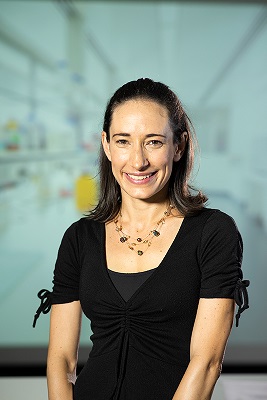Researcher Highlights
Better health for mums and babies
Rebecca Vanders
Dr Rebecca Vanders’ work is contributing to innovative new treatments for pregnant women, their babies, and those trying to conceive.

Rebecca is a passionate women’s health advocate. Her research is specifically focused on maternal health issues, including infertility caused by endometriosis and polycystic ovary syndrome, the effects of cigarette smoking during pregnancy, and maternal immune system changes. Above all, Rebecca’s work is about helping pregnant women and their babies stay healthy.
“My ultimate research goal is for women to be able to have a successful pregnancy from conception to birth and that children born to these women have a high quality of life.”
Combating maternal health vulnerabilities
Rebecca’s current research seeks to understand why pregnant women are more vulnerable to serious respiratory virus infections, such as influenza, and how their health can be protected through targeted, safe interventions.
“During every respiratory pandemic, pregnant women—especially those with underlying comorbidities like asthma—rank amongst the highest mortality rates of all susceptible groups.”
Throughout pregnancy, a woman’s immune system naturally alters to accommodate the presence of her growing baby. Slightly lowered defence mechanisms allow a baby to grow healthily—so the mum’s immune system doesn’t attack the new life—but it also leaves expecting mums vulnerable to certain viruses, like respiratory infections.
“These viruses can take advantage of the woman’s altered state, negatively affecting her health during pregnancy.”
As yet, researchers don’t know exactly how changes to the maternal immune system increase a woman’s risk of experiencing serious complications caused by respiratory virus infections. But by examining how key antiviral cells change during pregnancy, Rebecca is uncovering new insights into how our bodies work—and what’s causing maternal health vulnerabilities.
“We have found that, during pregnancy, respiratory virus infections such as the flu cause certain cells to become ‘exhausted’. This prevents cells from functioning properly to fight off the infection.
“Understanding how the immune system is altered following viral infection can allow us to design effective intervention strategies to save lives for both mothers and their unborn babies.”
Designing safer treatment options
Based on their research findings, Rebecca and her team are working on a new therapy to reverse cellular exhaustion during pregnancy, allowing key immune cells to fight off invading pathogens.
“If we can develop a treatment for pregnant women that protects them from the adverse outcomes of respiratory virus infections, especially during pandemics, this would quite literally save their lives."
“So far, the therapy has proved to not only improve a woman’s immune responses to the virus infection, it also has flow-on benefits for their children that we’re only just beginning to understand.”
For most expecting mothers, their baby’s safety is top of mind. So when health challenges strike, it can be difficult for women to know which treatments are safe, both for themselves and their little ones.
“When developing new treatments, one of our biggest challenges is to create strategies that are not only completely safe during pregnancy but that pregnant women will feel comfortable taking.”
Rebecca and her team are determined to meet these challenges head-on. Their newly designed therapy to help safeguard expecting mothers from deadly respiratory infections has already showed promising results, which are due to be published in 2019. Over the next year, the therapy will continue to undergo further refinements.
Hope for the future
Rebecca’s work is providing critical hope to millions of women. It’s also contributing to important, and potentially life-saving, conversations worldwide. In recent years, Rebecca has presented at national and international conferences, authored multiple papers, and received two fellowships, including the Thoracic Society of Australia and New Zealand Astra Zeneca Early Career Research Fellowship and and a highly competitive NHMRC Early Career Fellowship.
In 2018, Rebecca was among 15 highly talented researchers invited to participate in the University’s ThinkWell Early and Mid-Career Women’s Development Program, facilitated through the Faculty of Health and Medicine's Gender Equity Committee. The invitation was a nod to Rebecca’s evident career success so far—and served to further cement her research ambitions.
“In my opinion, pregnancy is the most wonderfully fascinating and complicated immune state created in a women’s body. It is so perfectly designed and yet so complicated to understand—which is both exciting and motivating!"
“I feel proud and humbled to be working in a research area that is helping to save the lives of mothers and their unborn children.”
The University of Newcastle acknowledges the traditional custodians of the lands within our footprint areas: Awabakal, Darkinjung, Biripai, Worimi, Wonnarua, and Eora Nations. We also pay respect to the wisdom of our Elders past and present.